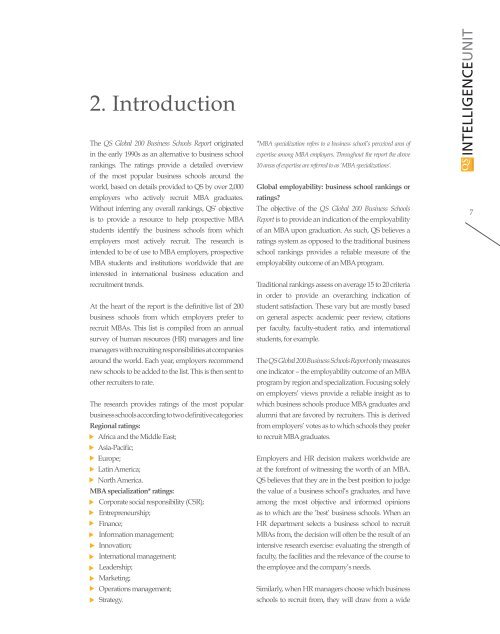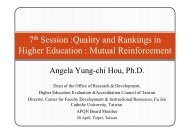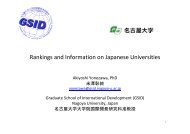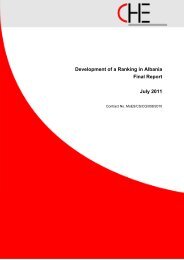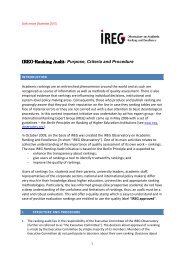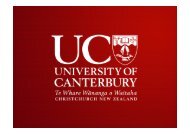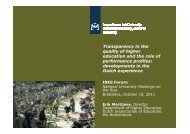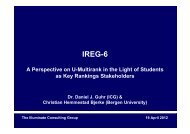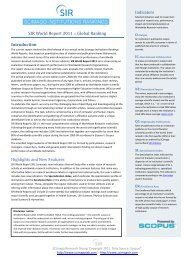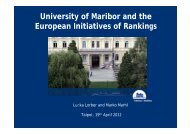QS Global 200 Business Schools Report 2012 - International ...
QS Global 200 Business Schools Report 2012 - International ...
QS Global 200 Business Schools Report 2012 - International ...
You also want an ePaper? Increase the reach of your titles
YUMPU automatically turns print PDFs into web optimized ePapers that Google loves.
2. Introduction<br />
The <strong>QS</strong> <strong>Global</strong> <strong>200</strong> <strong>Business</strong> <strong>Schools</strong> <strong>Report</strong> originated<br />
in the early 1990s as an alternative to business school<br />
rankings. The ratings provide a detailed overview<br />
of the most popular business schools around the<br />
world, based on details provided to <strong>QS</strong> by over 2,000<br />
employers who actively recruit MBA graduates.<br />
Without inferring any overall rankings, <strong>QS</strong>’ objective<br />
is to provide a resource to help prospective MBA<br />
students identify the business schools from which<br />
employers most actively recruit. The research is<br />
intended to be of use to MBA employers, prospective<br />
MBA students and institutions worldwide that are<br />
interested in international business education and<br />
recruitment trends.<br />
At the heart of the report is the definitive list of <strong>200</strong><br />
business schools from which employers prefer to<br />
recruit MBAs. This list is compiled from an annual<br />
survey of human resources (HR) managers and line<br />
managers with recruiting responsibilities at companies<br />
around the world. Each year, employers recommend<br />
new schools to be added to the list. This is then sent to<br />
other recruiters to rate.<br />
The research provides ratings of the most popular<br />
business schools according to two definitive categories:<br />
Regional ratings:<br />
Africa and the Middle East;<br />
Asia-Pacific;<br />
Europe;<br />
Latin America;<br />
North America.<br />
MBA specialization* ratings:<br />
Corporate social responsibility (CSR);<br />
Entrepreneurship;<br />
Finance;<br />
Information management;<br />
Innovation;<br />
<strong>International</strong> management;<br />
Leadership;<br />
Marketing;<br />
Operations management;<br />
Strategy.<br />
s<br />
s<br />
s<br />
s<br />
s<br />
s<br />
s<br />
s<br />
s<br />
s<br />
s<br />
s<br />
s<br />
s<br />
s<br />
*MBA specialization refers to a business school’s perceived area of<br />
expertise among MBA employers. Throughout the report the above<br />
10 areas of expertise are referred to as ‘MBA specializations’.<br />
<strong>Global</strong> employability: business school rankings or<br />
ratings?<br />
The objective of the <strong>QS</strong> <strong>Global</strong> <strong>200</strong> <strong>Business</strong> <strong>Schools</strong><br />
<strong>Report</strong> is to provide an indication of the employability<br />
of an MBA upon graduation. As such, <strong>QS</strong> believes a<br />
ratings system as opposed to the traditional business<br />
school rankings provides a reliable measure of the<br />
employability outcome of an MBA program.<br />
Traditional rankings assess on average 15 to 20 criteria<br />
in order to provide an overarching indication of<br />
student satisfaction. These vary but are mostly based<br />
on general aspects: academic peer review, citations<br />
per faculty, faculty-student ratio, and international<br />
students, for example.<br />
The <strong>QS</strong> <strong>Global</strong> <strong>200</strong> <strong>Business</strong> <strong>Schools</strong> <strong>Report</strong> only measures<br />
one indicator – the employability outcome of an MBA<br />
program by region and specialization. Focusing solely<br />
on employers’ views provide a reliable insight as to<br />
which business schools produce MBA graduates and<br />
alumni that are favored by recruiters. This is derived<br />
from employers’ votes as to which schools they prefer<br />
to recruit MBA graduates.<br />
Employers and HR decision makers worldwide are<br />
at the forefront of witnessing the worth of an MBA.<br />
<strong>QS</strong> believes that they are in the best position to judge<br />
the value of a business school’s graduates, and have<br />
among the most objective and informed opinions<br />
as to which are the ‘best’ business schools. When an<br />
HR department selects a business school to recruit<br />
MBAs from, the decision will often be the result of an<br />
intensive research exercise: evaluating the strength of<br />
faculty, the facilities and the relevance of the course to<br />
the employee and the company’s needs.<br />
Similarly, when HR managers choose which business<br />
schools to recruit from, they will draw from a wide<br />
7


